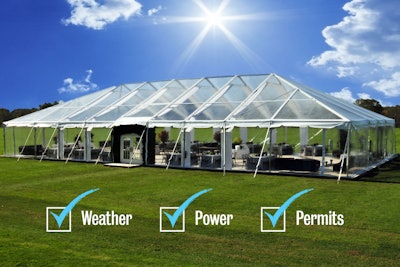
A tent may be a critical component of an event’s layout, shelter, or weather plan. But setting one up is not a matter to be taken lightly: Improper preparation or communication can result in danger, fines, and other liability issues. Ask these questions to reduce risks and ensure a smooth experience when setting up a tent outdoors.
1. Are the work permits secured?
Arranging for permits is critically important—but the task does not universally fall to one party, so planners should make no assumptions. Stamford Tent & Event Services vice president of sales and marketing Rick Bisesto says that the tenting company may file the permits, but not always, so planners must confirm. “If [a tent] is permitted, then a fire marshal will come and inspect it to [confirm] proper certifications and make sure drapery or any other fabric has been fireproofed.” He says permits can be expensive, but without one, organizers risk an event shutdown and a fine.
DomeGuys owner Matt Ochoa adds, “A fire marshal can stop all work with zero regard for any and all deadlines if fire safety is not satisfied.”
2. Is the company insured?
Planners should ask whether the tenting company is insured, and for how much. “If [a worker is] hurt on the job site, you want to make sure that [the company] is insured, and the homeowner or venue [are not liable],” Bisesto says. “And if something happens to the equipment, you need proper insurance to indemnify the other party.”
3. How will the tent be secured?
Planners need to know how the vendor plans to secure the tent—and whether it will be according to manufacturer’s specifications. “Ask questions about how the tent is secured and whether it’s being staked into the ground,” Bisesto says. “Tent companies can secure it with a weight balance, but [the approach to that] drastically differs through- out the industry. Some companies use manufacturers’ recommendations; others are trying to save money, but sometimes at the risk of safety.”
Ochoa breaks down the considerations for securing a tent: “For a build on ground, can stakes be sunk 36 inches, and are there water or other utility lines to avoid? For hard top, can anchor plates be bolted to it?”
He says that if the surface cannot be penetrated, organizers should consider weighting options carefully. “Water seems simple, but if the container is not certified potable, you can be required to have it pumped out and hauled to a water treatment facility. And if there is not a high-volume water source, it can take hours to fill the barrels. Concrete is great, but costly to move and heavy equipment is usually needed.”
4. Will the tent be accessible?
Communicate about the tent’s accessibility needs. “If there will be ramps and handicap access, ask if it’s going to be to code,” Bisesto says. “A ramp has to be one foot long for every inch high. Most likely, you’re not going to build a ramp straight out; you’re going to have to build left and right sections.”
Beyond the logistics, the accessibility issue is a matter of hospitality. “You never feel more like a jerk than when a person with special needs arrives and they have not been considered and accommodated,” Ochoa adds.
5. What is the weather contingency plan?
A planner may hope to defer making a rain plan until the forecast becomes more clear—but by then, it may be too late to effectively make a switch. “Ask a tent company whether they have a rain plan and what the policy is,” Bisesto says. “The company needs to plan ahead, especially in the busy season, so ask about the contingency right off the bat.”
6. What are the power needs?
Ochoa says that temperature within a tent can climb to 20 degrees warmer than the air outside. So planners should make sure tent vendors have a plan to keep guests comfortable with appropriate heating and cooling measures.
If the tent vendor is supplying HVAC, a likely scenario, then that company would need to bring large generators to power it. And the placement of those generators, as well as the logistics of their arrival, is of great importance to a smooth set up. (Sometimes a crane may need to place generators if a truck can’t access the area.)
Bisesto says planners should be sure to communicate power needs with their tenting company and other vendors, specifying all items that will be drawing power. “If that question [about power needs] is not asked, there’s a chance that the generator might fail,” he says.



















